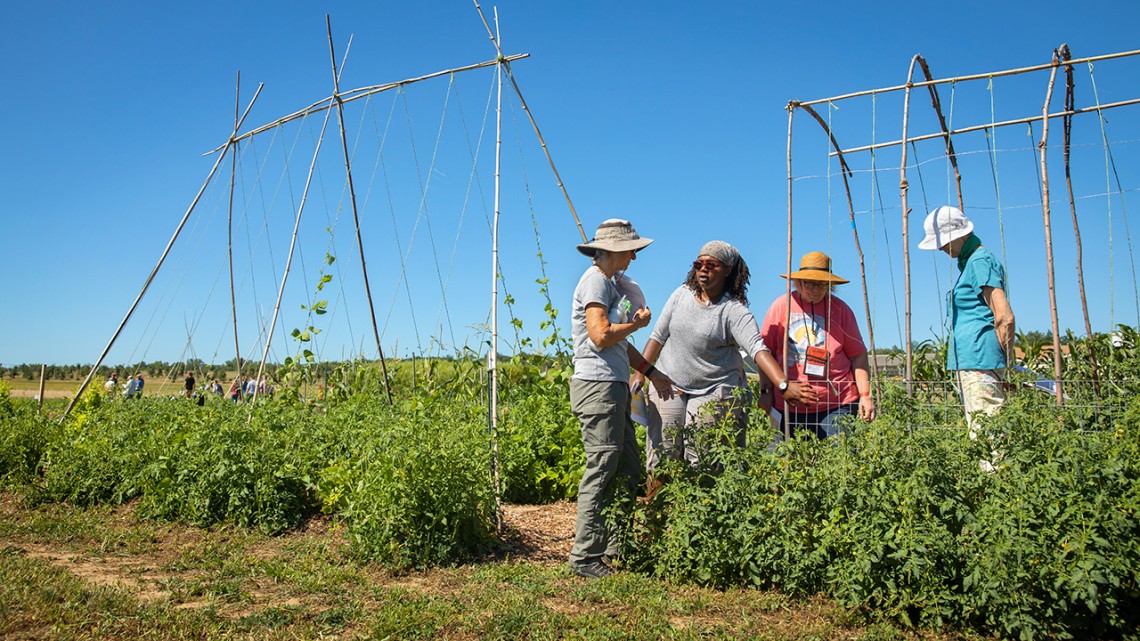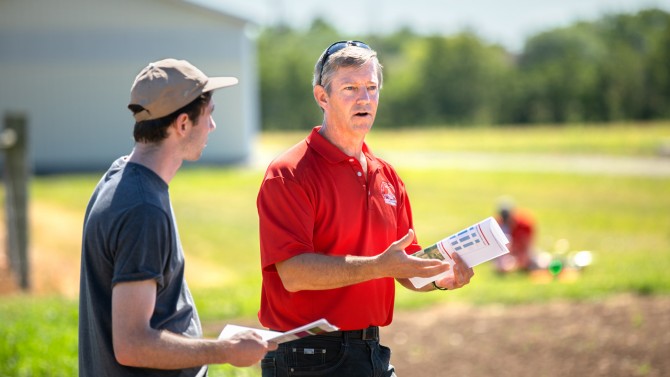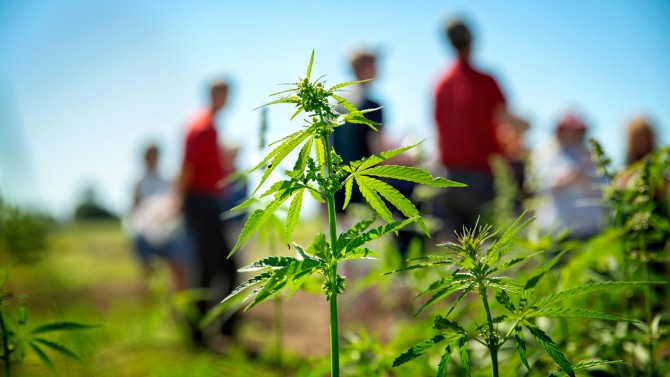
Aleah Louise Butler-Jones ’19, center, demonstrates a trellising system for tomatoes. The arch is made of willow branches from a research trial led by professor Larry Smart.
NY’s master gardeners take master class at Cornell
By Matt Hayes
More than 100 volunteers and educators in the Master Gardener Program visited Cornell AgriTech in Geneva, New York, July 19 to learn from graduate students, outreach experts and faculty about the latest in gardening practices and research.
The event, which drew participants from 20 New York counties and was organized by the Student Association of the Geneva Experiment Station (SAGES), included hands-on activities and interactive demonstrations that get to the heart of what volunteer gardeners do in their communities every day.
“Attending an event like this at Cornell AgriTech is a privilege, particularly because gardeners have the chance to learn about breaking research on real issues growers are experiencing in their garden,” said Donna Crawford, a gardener from Olivebridge in Ulster County.
Gardening is a vital way to introduce scientific ecological literacy and is a proven method to increase physical exercise, improve health and elevate personal satisfaction, said Steve Reiners, professor and chair in the Horticulture Section of the School of Integrative Plant Science.
“I have participated in field days like this for 30 years, and I don’t think I ever attended a better one. The grad students were so enthusiastic and excited to share their knowledge with the attendees, and our master gardener audience could not have been more receptive,” said Reiners.
Gardening is far more than a laid-back hobby: More than 7 million New York state households engage in garden-related activities, ranging from growing food to beautifying communities. School and community organizations are dedicated to growing fresh fruits and vegetables, and gardening is an important source of food security and environmental stewardship, according to experts at Cornell Garden-Based Learning.
The Master Gardener Program provides educators from across the state with research-based gardening resources and that support engaging and empowering learning experiences for New Yorkers. The program trains gardeners as volunteer peer educators in their communities and integrates research-based knowledge with local needs.
Cornell experts say that garden-based learning is critical for growing local food and addressing issues like food security, hunger, childhood obesity and nutrition. But gardens can also act as learning tools for issues such as climate change, sustainable energy and community development.
SAGES students have created their own garden. This year, Cornell AgriTech reserved nearly a full acre on a research farm for the students, who scaled-up their plots and designed installations for educational and inspirational purposes.
“This year’s garden plot added a new dimension to the activities of SAGES. We are proud to have an outlet at Cornell AgriTech through which we can fulfill our mission of outreach and extension,” said Hannah Swegarden, a doctoral student in the field of horticulture.
Organized and run by master’s and doctoral students, SAGES encourages the advancement of the agricultural sciences through research, outreach and teaching of issues relevant to New York state. In their exhibition garden the students are growing broccoli, kale and squash; beets and garlic; strawberries and melons; and hemp, sunflowers and herbs. They are also exploring methods like backyard trellis systems and designing exhibits that showcase gardening strategies like mulching and tilling.
“We are hoping that this year’s interactive garden design provides and model for future outreach and extension opportunities at Cornell AgriTech. In many ways, field tours and demonstrations allow for a dialogue between researchers and gardeners that doesn’t exist in other communication outlets,” Swegarden said.
The event included straw bale gardening, which has grown popular in urban and small-scale gardens. Straw bales are conditioned using water and fertilizer to make them suitable to grow most plants except root crops.
One plot used seeds from the Row 7 Seed Co., formed by Cornell plant breeder Michael Mazourek, Ph.D. ’08, chef Dan Barber and seed producer Matthew Goldfarb, while on another plot students raised crops not typically grown in New York. Peanuts, sweet potatoes, okra and cotton – all traditional southern crops – were all grown in a plot by research support specialist Jim Ballerstein and doctoral students Zachary Stansell and Swegarden.
“The master gardener event at Cornell AgriTech was a unique opportunity to interact with Cornell students in a give-and-take way,” said Margaret Bonner, a master gardner from Kerhonkson in Ulster County. “Cornell AgriTech student expertise on gardening was the highlight of the event, but it was also a chance for gardeners to offer their thoughts from a grower’s perspective.”
Matt Hayes is managing editor and social media officer for the College of Agriculture and Life Sciences. Erin Flynn, senior marketing manager at Cornell AgriTech, contributed to this report.
Media Contact
Get Cornell news delivered right to your inbox.
Subscribe


